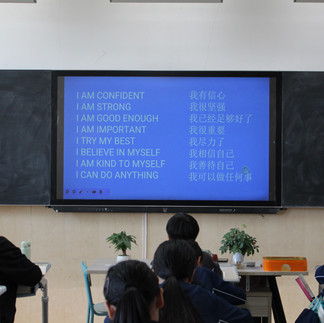Teaching Mental Health and Wellbeing to Chinese and Hong Kong Students: Breaking the Stigma
- Shannon Dhillon
- Mar 19
- 3 min read
Teaching mental health and wellbeing to my students in China and Hong Kong was one of the most meaningful and eye-opening experiences I’ve had. As a qualified MHFA Youth Mental Health First Aider, I knew how important it was to raise awareness about mental health—especially in cultures where the concept is often misunderstood or overlooked.
Mental health isn’t widely discussed in Chinese and Hong Kong education systems. The focus is heavily on academic success, discipline, and hard work—often at the expense of emotional wellbeing. For many of my students, the very idea of mental health was new to them. Talking about stress, anxiety, and depression wasn’t something they were used to, and there was a clear stigma around it. But I knew how important it was to break down these barriers and help them understand that mental health is just as important as physical health.
I started by introducing basic mental health concepts—what anxiety, depression, and stress look like, how to identify burnout and low mood, and why taking care of yourself matters. I taught them how to recognise when they weren’t looking after themselves—poor sleep, unhealthy eating habits, lack of motivation—and how to build healthier routines. For many, the idea of rest was completely foreign. Their schedules were so intense, with early starts and long study hours, that the idea of taking a break or setting boundaries felt unnatural to them.
We explored the importance of work-life balance, how to manage negative thoughts, and how to build self-esteem by quieting their inner critical voice. I reminded them that they weren’t robots or superhumans—they needed joy, rest, and balance in their lives to truly succeed. Success and happiness don’t have to be at odds with each other—it’s possible to achieve both.
One of the most powerful moments was helping them understand how to break intergenerational cycles of overwork and pressure. Many of them came from families where hard work and academic success were non-negotiable, but emotional wellbeing wasn’t seen as a priority. I helped them see that they had the power to create a new path—one where they could succeed without sacrificing their happiness and mental health.
Coming from an Asian background myself, I’m deeply aware of the cultural stigma around mental health. There’s often a sense that talking about mental health is a weakness or an indulgence. But I wanted to normalise these conversations—to show my students that their feelings were valid and that taking care of their mental health was not a sign of weakness, but of strength.
The response was overwhelming. My students wrote to me afterwards, sharing how much this had moved them. They told me they now had a renewed sense of purpose and perspective—that they finally felt like they could pursue success without feeling like they had to break themselves in the process.
This experience is why, at The Shan Academy, we take a holistic approach to student success. We understand the cultural pressures and high expectations that many Chinese and Hong Kong students face—but we don’t want them to burn out at the expense of their potential. We offer support, motivation, and coaching to help them succeed academically while also prioritising their emotional wellbeing. A balanced, confident, and happy student will always perform better—and more importantly, they’ll feel better too.
Success matters. But happiness and mental health matters too.
.png)





















Comments